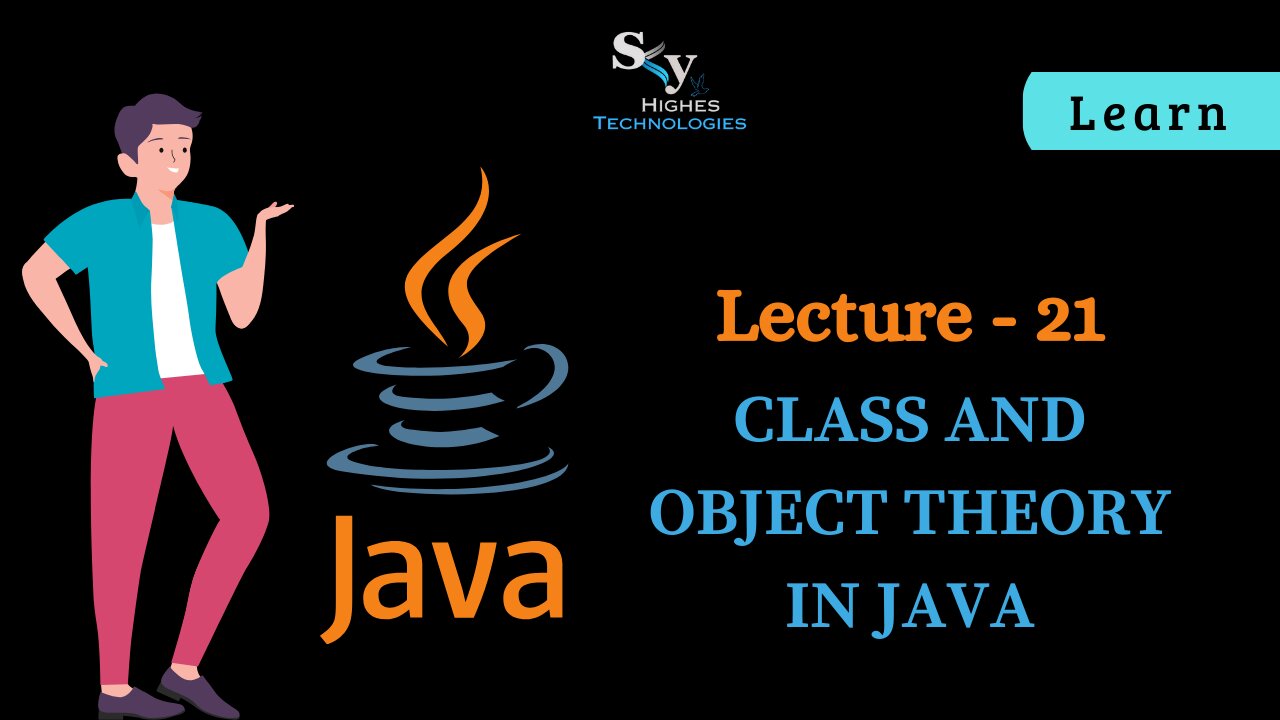Premium Only Content

#21 Class and Object Theory in JAVA | Skyhighes | Lecture 21
Classes and Objects: Foundations of OOP
Object-Oriented Programming (OOP): A programming paradigm that revolves around "objects" as fundamental building blocks. It models real-world entities and their relationships, promoting code reusability, maintainability, and modularity.
Classes: Blueprints or templates that define the characteristics (attributes) and behaviors (methods) of objects. They specify what objects of that class will look like and what they can do.
Objects: Instances of classes. They are concrete entities with specific state (values of their attributes) and the ability to perform actions (methods).
Key Concepts:
Class Declaration:
Use the class keyword followed by the class name.
Enclose attributes (variables) and methods (functions) within curly braces.
Java
public class Dog {
String breed;
int age;
void bark() {
System.out.println("Woof!");
}
}
Use code with caution. Learn more
Object Creation (Instantiation):
Use the new keyword followed by the class name and a constructor call.
Java
Dog myDog = new Dog();
Use code with caution. Learn more
Attributes (Member Variables):
Represent the data associated with an object.
Define them within the class using various data types (e.g., int, String, boolean).
Methods (Member Functions):
Define the actions that objects can perform.
Contain code blocks that operate on the object's attributes and other data.
Accessing and Modifying Object State:
Use the dot (.) operator to access attributes and methods of an object.
Java
myDog.breed = "Labrador";
myDog.bark(); // Output: "Woof!"
Use code with caution. Learn more
Understanding the Relationship:
A class is like a recipe for creating objects.
Each object is a unique instance of the class, with its own set of attribute values.
Objects interact with each other by calling each other's methods.
Benefits of OOP:
Encapsulation: Bundling data and behavior within objects, protecting data integrity.
Inheritance: Creating new classes (subclasses) that inherit properties and behaviors from existing classes (superclasses), promoting code reusability.
Polymorphism: Objects of different classes responding to the same method call in different ways, allowing for flexible and adaptable code.
Remember: Classes and objects are fundamental to OOP and essential for structuring Java programs effectively. Understanding their relationship and properties is crucial for building well-organized and maintainable software.
-
 15:32
15:32
Dad Saves America
18 hours ago $4.85 earnedThe Original Sin of American Public Schools - Poisoning of the American Mind: Pt 2
28.7K17 -
 11:04
11:04
Chrissy Clark
22 hours agoA New Era For The Daily Wire?
28.8K8 -
 13:07
13:07
Degenerate Jay
19 hours ago $2.25 earnedBatman's Voice Actor, Kevin Conroy, Left This Inspirational Message
32.6K6 -
 11:34
11:34
Sugar Spun Run
1 day ago $2.04 earnedDubai Chocolate Cookies
32.8K9 -
 4:08:26
4:08:26
The Bubba Army
1 day agoTrump ORDERS Epstein Files Released! - Bubba the Love Sponge® Show | 7/18/25
47.4K9 -
 LIVE
LIVE
blackfox87
4 hours ago24+ HOUR STREAM!!! | PREMIUM CREATOR | #DisabledVeteran
55 watching -
 32:26
32:26
Uncommon Sense In Current Times
17 hours ago $2.12 earnedWhy Pastors Must Rise Again | Dan Fisher on the Black Robed Regiment & Saving the Republic
35.9K4 -
 9:43
9:43
Actual Justice Warrior
20 hours agoJapan KILLS Trans Zelda
32.1K21 -
 13:32
13:32
Nate The Lawyer
2 days ago $1.53 earnedTiffany Henyard Replacement Seems Just As Corrupt As She Was,
23.4K16 -
 10:41
10:41
Winston Marshall
19 hours ago“Protests Have Begun!” Mahyar Tousi On What the Media Won’t Tell You About Iran
20.3K6